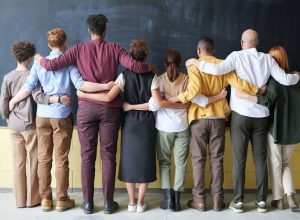 Imagine walking into a room full of strangers. It might be a new job, a local event, or a community group you just joined. For many of us, these situations can be both exciting and a little intimidating. Some people might feel hesitant about meeting new people, while others look forward to meeting new people with similar interests and making new connections. In today’s world as technology often replaces face-to-face interaction, real human connections are more important than ever. Meeting new people, whether at work, in social groups, or through shared interests, can make our lives much more vulnerable. But building true connections isn’t always easy. It takes patience, empathy, and sometimes the courage to step out of our comfort zones.
Imagine walking into a room full of strangers. It might be a new job, a local event, or a community group you just joined. For many of us, these situations can be both exciting and a little intimidating. Some people might feel hesitant about meeting new people, while others look forward to meeting new people with similar interests and making new connections. In today’s world as technology often replaces face-to-face interaction, real human connections are more important than ever. Meeting new people, whether at work, in social groups, or through shared interests, can make our lives much more vulnerable. But building true connections isn’t always easy. It takes patience, empathy, and sometimes the courage to step out of our comfort zones.
This guide dives into why making connections within any community can be a game changer for personal growth and happiness. It also shares practical tips for anyone looking to build and keep meaningful relationships.

A Community is a group of people who come together, forming meaningful relationships that give them a sense of belonging. It’s not just about being in the same place. It’s about actively connecting with others, supporting them, and feeling supported in return. Communities can be created on shared interests, beliefs, or goals, like in a volunteer organization, workplace, or online community. They can also be physical, like a neighborhood where people know one another. In a true community, members interact frequently, supporting one another in ways that build trust and mutual respect. This connection generally becomes deeper as people share experiences, celebrate successes, get over problems, or work toward a shared target. Communities provide individuals a sense of belonging to something larger than themselves, offering a “home” where they are appreciated and accepted. This sense of solidarity is what elevates a community above just a collection of people and it becomes a place where individuals grow, supported by and contributing to the group’s unity. This feeling of belonging is important because, humans are social beings who develop n connection.
When we feel accepted and supported, it helps us understand ourselves better and strengthens our mental and emotional. Connections remind us that we’re not alone and give people to rely on and celebrate with. More than just boosting our mood, these social connection have real effects on our health. Research shows that people who feel connected experience less stress, lower rates of depression, and even stronger immune systems. Friendships, family bonds, and supportive networks all provide stability and comfort that can ease life’s challenges, helping us navigate tough times with resilience. In fact, having a strong support network can be as essential to our health as exercise or a balanced diet. These benefits extend to the whole community. When each person feels valued and connected, they’re more likely to reach out, share, and uplift others. This creates a cycle of support that strengthens everyone involved, making the community a true source of warmth, resilience, and growth.
Building meaningful connections in any community starts with finding things we share with others. When people come together around common interests, such as a hobby, a goal, or a shared experience, it’s easier to start conversations and feel like we belong.
First, begin by connecting with people who have similar interests or experiences. This could mean joining a neighborhood group, a local club, or even an online forum. When people have something in common, it helps break the ice and makes it easier to connect and build friendships.
Next, focus on building trust and creating a safe environment. For connections to grow, people need to feel safe and respected. This involves listening, showing kindness, and creating a space where everyone feels free to be themselves. When people feel accepted and valued, they’re more likely to open up and support each other, which deepens the sense of connection.
After trust is established, keep those connections strong by staying engaged. Regular interactions, such as meeting up, joining group activities, or even just checking in with a quick message, help maintain relationships. Staying engaged shows others that they matter, and this makes everyone feel more connected and appreciated.
Finally, use simple tools and resources to connect with others. Building connections in person is important, but online communities provide fantastic opportunities to meet new people, too. Platforms like Facebook groups, Meetup, and community boards allow you to find individuals who share similar interests and passions, no matter where they are located. These online tools not only help you connect with others through discussions and shared content but also make it easier to arrange in-person meetups. By participating in these communities, you can strengthen your social ties, discover new friendships, and feel a greater sense of belonging. Embracing both online and offline interactions can enrich your life and enhance your connections within any community.
By focusing on these steps, finding common ground, building trust, staying engaged, and using simple tools you can create strong, meaningful connections in your community. This approach helps everyone feel valued and makes the community a more welcoming and supportive place for everyone.
In a nutshell making real connections in every community is both accessible and exciting. Begin by looking for groups or activities that match your interests, such as local clubs, volunteer opportunities, or online forums. Engaging with these groups helps you to meet people who share your interests.
As you interact with others, try to be personable and genuinely interested in their ideas and experiences. Listening and showing empathy will help to establish trust, making it easier for everyone to open up and share.By following these steps which is finding shared interests, being friendly, staying engaged, and using available resources, you can cultivate strong, meaningful connections that enhance your community.
Finally, every effort you make helps to create a positive environment in which everyone feels appreciated and involved. Remember that the process of making connections is ongoing, and each relationship you build contributes to the rich experience of communal life. So, take the first step now, and see how your efforts can change not only your life, but the lives of people around you
Michael. (2024, September 22). Why connection matters. Michael Swerdloff. https://www.michaelswerdloff.com/why-connection-matters/
Canadian Disability Studies Association. (2016). Understanding Community. Canadian Journal of Disability Studies.
Meaningful social Connections and building a Community – OAAP. (n.d.). https://www.oaap.org/blog/thriving-today/meaningful-social-connections-and-building-a-community/
Higher Logic. (2024, October 21). What is an Online Community? The Basics & Benefits. https://www.higherlogic.com/blog/what-is-an-online-community/